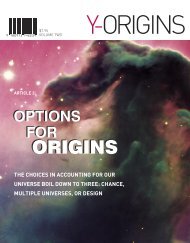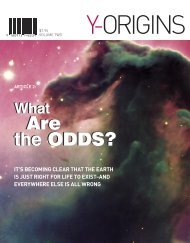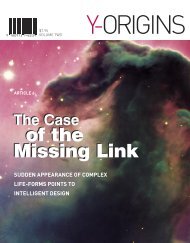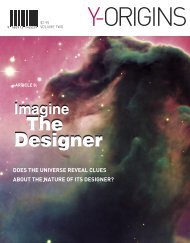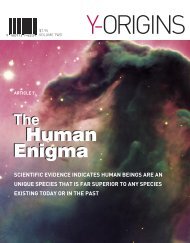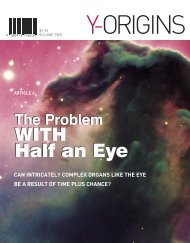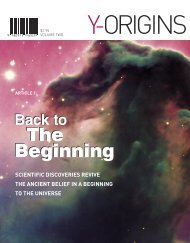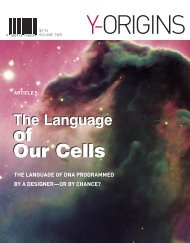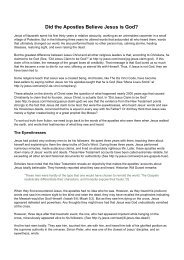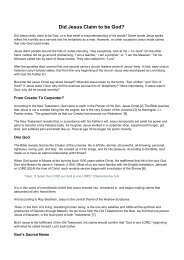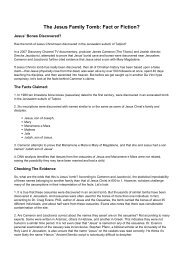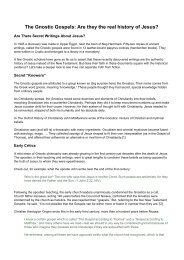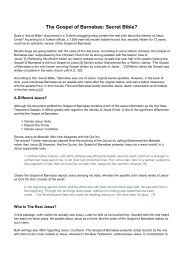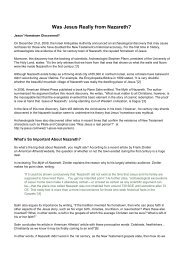1898
You also want an ePaper? Increase the reach of your titles
YUMPU automatically turns print PDFs into web optimized ePapers that Google loves.
could never have formed, and we wouldn’t be here.<br />
And for life to exist, the conditions in our solar system and planet also need to be just right. For example, we all<br />
realize that without an atmosphere of oxygen, none of us would be able to breathe. And without oxygen, water<br />
couldn’t exist. Without water there would be no rainfall for our crops. Other elements such as hydrogen, nitrogen,<br />
sodium, carbon, calcium, and phosphorus are also essential for life.<br />
But that alone is not all that is needed for life to exist. The size, temperature, relative proximity, and chemical<br />
makeup of our planet, sun, and moon also need to be just right. And there are dozens of other conditions that<br />
needed to be exquisitely fine-tuned or we wouldn’t be here to think about it. [12]<br />
Scientists who believe in God may have expected such fine-tuning, but atheists and agnostics were unable to<br />
explain the remarkable “coincidences.” Theoretical physicist Stephen Hawking, an agnostic, writes, “The<br />
remarkable fact is that the values of these numbers seem to have been very finely adjusted to make possible the<br />
development of life.”[13]<br />
Accident or Miracle?<br />
But couldn’t this fine-tuning be attributed to chance? After all, odds-makers know that even long shots can<br />
eventually win at the racetrack. And, against heavy odds, lotteries are eventually won by someone. So, what are<br />
the odds against human life existing by chance from a random explosion in cosmic history?<br />
For human life to be possible from a big bang defies the laws of probability. One astronomer calculates the odds<br />
at less than 1 chance in a trillion trillion trillion trillion trillion trillion trillion trillion trillion trillion trillion trillion. [14] It<br />
would be far easier for a blind-folded person—in one try— to discover one specially marked grain of sand out of all<br />
the beaches of the world.<br />
Another example of how unlikely it would be for a random big bang to produce life is one person winning over a<br />
thousand consecutive mega-million dollar lotteries after purchasing only a single ticket for each.<br />
What would be your reaction to such news? Impossible—unless it was fixed by someone behind the scenes, which<br />
is what everyone would think. And that is what many scientists are concluding—Someone behind the scenes<br />
designed and created the universe.<br />
This new understanding of how miraculous human life is in our universe led the agnostic astronomer George<br />
Greenstein to ask, “Is it possible that suddenly, without intending to, we have stumbled upon the scientific proof of<br />
the existence of a Supreme Being?”[15]<br />
However, as an agnostic, Greenstein maintains his faith in science, rather than a Creator, to ultimately explain our<br />
origins. [16]<br />
Jastrow explains why some scientists are reluctant to accept a transcendent Creator,<br />
There is a kind of religion in science; it is the religion of a person who believes there is order and harmony<br />
in the Universe…This religious faith of the scientist is violated by the discovery that the world had a<br />
beginning under conditions in which the known laws of physics are not valid, and as a product of forces or<br />
circumstances we cannot discover. When that happens, the scientist has lost control. If he really examined<br />
the implications, he would be traumatized. [17]<br />
It is understandable why scientists like Greenstein and Hawking seek other explanations rather than attribute our<br />
finely-tuned universe to a Creator. Hawking speculates that other unseen (and unprovable) universes may exist,<br />
increasing the odds that one of them (ours) is perfectly fine-tuned for life. However, since his proposal is<br />
speculative, and outside of verification, it can hardly be called “scientific.” Although he is also an agnostic, British<br />
astrophysicist Paul Davies dismisses Hawking’s idea as too speculative. He writes, “Such a belief must rest on



